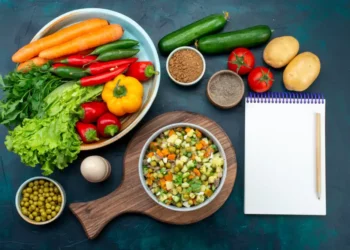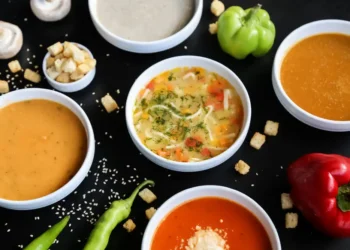Table of Contents
Welcome to our comprehensive guide on the “15-Day Vegan Diet Challenge.” If you’re looking to transform your health, contribute to environmental sustainability, or simply explore the rich world of vegan cuisine, this challenge is a perfect start. Over the next few weeks, we’ll guide you through every step of adopting a plant-based lifestyle. From understanding the health benefits of a vegan diet to practical grocery shopping tips, easy-to-prepare vegan recipes, and managing cravings, we’ve got you covered. Whether you’re a seasoned vegan or a curious newcomer, this challenge is designed to be informative, engaging, and most importantly, achievable. Join us on this exciting journey and discover how a vegan diet can enrich your life in ways you never imagined!
1 Introduction to the 15-Day Vegan Diet Challenge
Are you ready to embark on a journey that’s not just about food, but about discovery? Welcome to the 15-Day Vegan Diet Challenge, a journey that introduces you to the vibrant world of plant-based eating. It’s not just a diet shift; it’s about unearthing new tastes, boosting your health, and positively impacting our planet.

What Does This Challenge Entail?
For 15 days, your plate will be a mosaic of plant-based foods. This means setting aside meat, dairy, and eggs to make room for a colorful array of fruits, vegetables, grains, nuts, and seeds. It’s about exploring the richness of vegan cuisine, bursting with flavors you might not have experienced before.
Why Opt for the Vegan Diet Challenge?
People come to the vegan table for various reasons. Maybe you’re looking to shed some pounds, gain more energy, or keep your heart happy. Or perhaps it’s the environment and animal welfare that are calling out to you. Whatever your motivation, this challenge is a step towards nourishing yourself with nature’s best while learning about sustainable eating.
Getting Set for Success
The key to thriving on the 15-Day Vegan Diet Challenge lies in being prepared. In the following sections, you’ll find a treasure trove of tips for meal planning, a collection of easy yet tantalizing vegan recipes, and advice for vegan-friendly dining options. Whether cooking is your passion or something new for you, these insights will pave the way for a fulfilling experience.
Discover and Enjoy
Remember, the 15-Day Vegan Diet Challenge is about more than just changing your diet; it’s about enriching your lifestyle. This challenge invites you to step into a world of new ingredients, experiment with untried flavors, and perhaps redefine your food philosophy. It’s not just a diet change; it’s a step towards a more vibrant, health-conscious, and eco-friendly you.
2 Health Benefits of a Vegan Diet
Diving into a vegan diet isn’t just about exploring new recipes; it’s a journey towards a healthier you. The perks of embracing a plant-based lifestyle are numerous, and they’re not just hearsay—science backs them up. Let’s unpack the ways in which going vegan can be a game-changer for your health.

Heart Health: A Top Priority
One of the standout benefits of a vegan diet is its impact on heart health. By favoring fruits, veggies, whole grains, and nuts, you’re essentially giving your heart the nutrients it loves and cutting out what it doesn’t, like excessive saturated fats. The result? A happier, healthier heart with reduced risks of heart disease.
Navigating Weight Management
If the scale has been your nemesis, a vegan diet might be the ally you’ve been looking for. Plant-based foods tend to be lower in calories yet high in fiber, meaning they fill you up without weighing you down. It’s a natural shift towards managing your weight effectively.
Balancing Blood Sugar
For anyone keeping an eye on blood sugar levels, the vegan diet is a strong contender. Its low unhealthy fat and high fiber content are a dynamic duo for stabilizing blood sugar and boosting insulin sensitivity. It’s a promising pathway for those managing or warding off type 2 diabetes.

Skin Health: The Vegan Glow
Ever heard of the ‘vegan glow’? There’s truth to it. The vitamins, antioxidants, and hydration you get from plant-based foods can lead to healthier, more vibrant skin. It’s not just about cutting out problem foods like dairy; it’s about what you’re adding to your diet that makes all the difference.
Longevity and Overall Wellness
Embracing a vegan diet could be your ticket to a longer, healthier life. The diet’s natural avoidance of processed meats and focus on whole foods reduces your risk of several chronic diseases, including certain cancers. It’s about nurturing your body today to enjoy more healthy years ahead.
Mental Clarity and Wellbeing
Finally, the impact of a vegan diet isn’t limited to physical health. Many report a boost in mental clarity and overall wellbeing. The nutritional richness, combined with the ethical peace of knowing you’re eating cruelty-free, plays a big role in mental health.
3 Nutritional Considerations
Switching to a vegan diet isn’t just about cutting out animal products; it’s about ensuring your body gets all the nutrients it needs from plant-based sources. Let’s break down the key nutritional considerations you should keep in mind to maintain a healthy and balanced vegan diet.

Protein Power
One of the first questions you might face is, “Where do you get your protein?” Rest assured, plenty of plant-based protein sources are out there. Legumes, lentils, tofu, tempeh, and quinoa are just a few options that pack a protein punch. Including a variety of these in your diet ensures you’re getting all the essential amino acids your body needs.
Iron Insights
Iron is vital for healthy blood and energy levels, and it’s abundantly available in the plant kingdom. Think leafy greens, lentils, and fortified cereals. However, plant-based iron isn’t always easily absorbed by the body. Pairing these foods with vitamin C-rich items like oranges or bell peppers can boost iron absorption.

Calcium for Bones
Dairy products aren’t the only source of calcium. Many greens, like broccoli and kale, along with fortified plant milks and juices, are excellent sources. Including these in your daily meals will help keep your bones strong and healthy.
Vitamin B12 – Don’t Forget It
Vitamin B12 is crucial for nerve function and blood formation, but it’s mostly found in animal products. Luckily, many vegan foods are fortified with B12, like plant milks, some breakfast cereals, and nutritional yeast. A B12 supplement can also be a reliable source.
Omega-3 Fatty Acids
Essential for brain health, omega-3s are found in flaxseeds, chia seeds, walnuts, and hemp seeds. Incorporating these into your diet is a simple way to ensure you’re getting these vital nutrients.
Mindful Meal Planning
Balancing a vegan diet means being mindful about what’s on your plate. Ensuring a mix of fruits, vegetables, whole grains, nuts, and seeds is key to covering all your nutritional bases.
4 Planning Your 15-Day Meal Plan
Embarking on the 15-Day Vegan Diet Challenge is exciting, but the key to success lies in smart meal planning. It’s not just about avoiding animal products; it’s about creating a balanced, nutritious, and enjoyable eating plan. Here’s how you can craft your own 15-day vegan journey with ease and variety.

Start with a Basic Framework
Begin by outlining your meals for the week. Think in terms of breakfast, lunch, dinner, and snacks. Aim for variety to keep things interesting and to ensure a wide range of nutrients. A good mix of grains, legumes, vegetables, fruits, nuts, and seeds throughout the day is ideal.
Batch Cooking and Prep
Save time and stress by batch cooking. Prepare staples like rice, quinoa, or beans in bulk. Chop veggies ahead of time for quick assembly. Soups, stews, and casseroles are great for cooking ahead and reheating for meals.
Breakfasts to Kickstart Your Day
For breakfast, think oatmeal topped with nuts and fruits, smoothies packed with greens and plant-based milk, or whole-grain toast with avocado or peanut butter. These options are not only nutritious but also quick to prepare.
Lunches That Pack a Punch
Lunch could be hearty salads loaded with beans and seeds, whole-grain wraps filled with roasted veggies and hummus, or leftovers from the night before. The goal is to have a balanced mix of protein, carbs, and fats to keep you fueled for the afternoon.
Dinners to Wind Down
Dinner is a time to relax and enjoy more elaborate dishes. Stir-fries with tofu and a medley of vegetables, hearty vegan chili, or pasta with a rich tomato and lentil sauce make satisfying meals. Remember to incorporate greens for an extra nutrient boost.
Snacks for Sustained Energy
Snacks are essential to keep your energy up between meals. Fresh fruits, nuts, seed crackers with vegan cheese, or vegetable sticks with dips are great choices.
Hydration is Key
Don’t forget to stay hydrated. Water, herbal teas, and fruit-infused waters are great choices to keep you refreshed and hydrated.
5 Easy-to-Prepare Vegan Recipes
15-Day Vegan Diet Challenge doesn’t mean you’ll be spending hours in the kitchen. In fact, part of the beauty of a plant-based diet is how simple and quick many of the dishes can be. Let’s dive into some easy-to-prepare vegan recipes that will make your 15-day challenge a breeze and a delight.

1. Quick and Hearty Vegan Chili
Who doesn’t love a good chili? This one-pot wonder is packed with beans, tomatoes, corn, and spices. Just toss everything into a pot and let it simmer. Serve it with some crusty bread or over brown rice for a satisfying meal.
2. Overnight Oats for a No-Fuss Breakfast
Mix rolled oats with plant-based milk, a sweetener of your choice, and your favorite fruits and nuts. Let it sit in the fridge overnight, and you have a creamy, delicious breakfast waiting for you in the morning.
3. Simple Stir-Fry with Tofu and Vegetables
A stir-fry is a great way to use whatever vegetables you have on hand. Pair them with tofu for protein, add some soy sauce and garlic for flavor, and serve over rice or noodles for a quick and nutritious meal.
4. Avocado Toast with a Twist
Elevate your avocado toast by adding sliced tomatoes, a sprinkle of hemp seeds, and a dash of lemon juice. It’s a simple yet luxurious breakfast or snack that’s both nourishing and satisfying.
5. Classic Hummus for Dips and Spreads
Blend chickpeas, tahini, lemon juice, garlic, and olive oil to create a creamy hummus. It’s perfect for dipping vegetables, spreading on sandwiches, or as a companion to a salad.
6. Veggie-Packed Pasta Salad
Toss your favorite pasta with a mix of fresh vegetables, a simple vinaigrette, and some herbs. It’s a versatile dish that works well for lunch, dinner, or even as a side.
6 Grocery Shopping Tips
Navigating the grocery store during your 15-Day Vegan Diet Challenge can be a breeze with the right strategies in place. Knowing what to look for and how to shop efficiently can make your vegan journey both enjoyable and stress-free. Here are some essential tips to help you shop smartly for your vegan diet.

1. Plan Before You Go
Before stepping out, make a meal plan for the week. This helps you create a focused grocery list, ensuring you buy only what you need, reducing waste and saving money. Stick to your list to avoid impulse buys that might not align with your vegan goals.
2. Embrace Whole Foods
Focus on whole, unprocessed foods like fruits, vegetables, grains, nuts, and seeds. These are the staples of a healthy vegan diet and can be found in most grocery stores. They’re not only nutritious but also versatile and can be used in a multitude of recipes.
3. Know Your Vegan Protein Sources
Protein is key in any diet. Familiarize yourself with plant-based protein sources like lentils, chickpeas, tofu, tempeh, and seitan. These can be found in the health food or international sections of most stores.
4. Read Labels Carefully
It’s important to read labels to ensu
re products are vegan. Look out for hidden animal-derived ingredients like gelatin, whey, and casein. As you get familiar with vegan-friendly brands and products, shopping becomes much quicker.
5. Explore the Bulk Section
The bulk section can be a goldmine for vegans. Here, you can find grains, nuts, seeds, and legumes at a lower cost and in the exact quantities you need. It’s also a more sustainable shopping choice, reducing packaging waste.
6. Don’t Forget Frozen
Frozen fruits and vegetables can be just as nutritious as fresh and last much longer. They’re great for smoothies, stir-fries, and as quick additions to meals.
7 Vegan Substitutes for Common Non-Vegan Foods
Adopting a vegan lifestyle for the 15-Day Vegan Diet Challenge doesn’t mean you have to give up on your favorite flavors and textures. With a myriad of vegan substitutes available, you can recreate beloved dishes in a plant-based way. Let’s explore some common non-vegan foods and their vegan alternatives.

1. Cheese
Vegan cheese has come a long way. Made from nuts, soy, or root vegetables, these cheeses melt, spread, and taste similar to dairy cheese. They’re perfect for sandwiches, pizzas, and cheese platters.
2. Milk
Plant-based milks are a staple in any vegan diet. Almond, soy, oat, and coconut milk are all great substitutes, each with its own unique flavor and texture. Use them in cereals, baking, or as a drink.
3. Eggs
For baking, mashed bananas, applesauce, or commercial egg replacers can substitute eggs. Tofu is excellent for scrambles and quiches, mimicking the texture of cooked eggs.
4. Meat
The variety of vegan meat substitutes is impressive. From burgers to sausages, there are plant-based versions that are surprisingly similar in taste and texture. They are great for grilling, stir-fries, and as protein sources.
5. Honey
Maple syrup, agave nectar, and date syrup are all sweet alternatives to honey. They work well in baking, as sweeteners in beverages, or drizzled over pancakes.
6. Gelatin
Agar-agar and fruit pectin are vegan alternatives to gelatin. They can be used in desserts like jellies, puddings, and mousses.
8 Dealing with Cravings and Challenges
Navigating cravings and overcoming challenges are part and parcel of the 15-Day Vegan Diet Challenge. It’s natural to encounter some hurdles along the way, especially if you’re new to a plant-based lifestyle. Let’s discuss strategies to effectively manage these moments, keeping you on track with your vegan journey.
1. Understanding Your Cravings
Cravings often stem from habit, nutritional needs, or emotional responses. Understanding why you crave certain foods can help you find vegan alternatives that satisfy those needs. For example, craving cheese might indicate a need for more fatty, rich foods in your diet, which can be met with nut-based cheeses or avocados.
2. Keeping Healthy Snacks on Hand
Prevent cravings before they start by keeping healthy vegan snacks readily available. Nuts, fruits, veggie sticks, and whole-grain crackers are great options. These snacks can curb hunger and provide a quick energy boost.
3. Experimenting with New Recipes
Boredom with your food choices can lead to cravings. Experimenting with new vegan recipes can keep your meals exciting and satisfying. There are countless recipes online that cater to various cuisines and preferences.
4. Building a Support System
Having a support system can be crucial in managing cravings. Connect with other vegans, join online communities, or participate in local vegan groups. Sharing experiences and tips can be incredibly motivating.
5. Listening to Your Body
Your body’s nutritional needs should always be a priority. If you’re constantly hungry or experiencing intense cravings, it might be time to reassess your diet. Ensure you’re getting enough calories, protein, and other nutrients.
6. Giving Yourself Grace
Remember, transitioning to a vegan diet is a journey. Slip-ups can happen, and that’s okay. Give yourself grace and focus on making better choices moving forward.
9 Tracking Your Progress
As you journey through the 15-Day Vegan Diet Challenge, tracking your progress can be incredibly rewarding and insightful. It’s not just about adhering to a new way of eating; it’s also about noticing the changes in your body and mindset. Let’s look at effective ways to monitor your journey and celebrate your successes.

1. Keep a Food Diary
Start by keeping a food diary. Write down everything you eat and drink, along with notes on how you feel afterwards. This can help you identify patterns, discover new favorite foods, and ensure you’re getting a balanced diet.
2. Note Physical Changes
Pay attention to physical changes. This might include weight loss, improved digestion, or clearer skin. It’s also important to notice any increased energy levels or improved sleep patterns.
3. Reflect on Emotional Well-being
Your emotional well-being is just as important. Reflect on any changes in your mood or stress levels. Many find a plant-based diet to bring a sense of mental clarity and emotional balance.
4. Use Apps and Tech
Leverage technology to track your progress. There are numerous apps available that can help you monitor your food intake, nutritional balance, and even physical changes like weight and sleep patterns.
5. Check-In Regularly
Set aside time each week to review your progress. This could be a quiet moment of reflection or a more structured assessment using your food diary and any tracking apps.
6. Celebrate Milestones
Don’t forget to celebrate your milestones, no matter how small. Completing a week of the challenge, trying new recipes, or noticing positive changes are all achievements worth acknowledging.
10 Physical Activity and Exercise
Incorporating physical activity and exercise into your 15-Day Vegan Diet Challenge can amplify the benefits of your new diet. Exercise complements a plant-based diet perfectly, enhancing your overall health and wellness. Here’s how you can integrate physical activity into your vegan challenge for maximum benefit.

1. Start with What You Enjoy
Exercise doesn’t have to be a chore. Start with activities you enjoy – whether that’s walking, cycling, yoga, or swimming. Enjoyment is key to consistency, so pick something that feels more like a treat than a task.
2. Align Exercise with Your Energy Levels
On a vegan diet, you might notice changes in your energy levels. Use this to your advantage. If you find yourself more energized, perhaps try more vigorous exercises. If you’re adjusting, gentler activities like walking or yoga can be beneficial.
3. Stay Hydrated and Fueled
Your body will need extra hydration and fuel, especially as you exercise. Drink plenty of water and include energy-boosting foods in your diet, such as bananas, nuts, and whole grains.
4. Listen to Your Body
Pay close attention to your body’s responses. If you feel fatigued or sore, allow yourself time to rest and recover. It’s important to strike a balance between activity and rest.
5. Track Your Fitness Progress
Just as you track your diet, keep an eye on your fitness progress. Use a journal or a fitness app to note down your exercise routines, how you feel after exercising, and any improvements in your fitness levels.
6. Combine Cardio and Strength Training
For a well-rounded fitness routine, combine cardiovascular exercises with strength training. This could mean pairing jogging or cycling with bodyweight exercises.
11 Post-Challenge Transition
Completing the 15-Day Vegan Diet Challenge is a significant achievement. But what comes next? The transition post-challenge is an opportunity to reflect on your experiences and decide how you want to incorporate what you’ve learned into your everyday life. Let’s explore how you can make this transition smoothly and sustainably.
1. Assess Your Experience
Start by reflecting on your challenge. What did you enjoy? What did you find difficult? Understanding your experiences will guide you in shaping your diet going forward. Maybe you discovered a love for plant-based meals, or perhaps you found certain aspects challenging.
2. Gradual Changes vs. Full Transition
Decide if you want to transition to a fully vegan diet or if you prefer a more gradual approach, such as being vegan during the week and more flexible on weekends. There’s no one-size-fits-all approach; it’s about what works for you.
3. Keep Exploring Vegan Options
Regardless of your decision, continue exploring vegan options. Trying new recipes and foods can keep your meals exciting and ensure a varied, balanced diet.
4. Listen to Your Body
Pay close attention to your body’s needs. If you decide to reintroduce non-vegan foods, do so gradually and monitor how your body reacts. It’s important to maintain the nutritional balance you’ve achieved during the challenge.
5. Maintain Balance and Moderation
Whether you choose to continue with a fully vegan diet or not, the principles of balance and moderation still apply. Focus on whole, unprocessed foods and maintain a varied diet to ensure you get all the necessary nutrients.
6. Seek Support and Resources
Don’t hesitate to seek support and resources. This can be in the form of vegan cooking classes, nutritionists familiar with plant-based diets, or online communities where you can share experiences and get advice.
12 Conclusion and Encouragement
Congratulations on taking the bold step to embark on the 15-Day Vegan Diet Challenge! Whether you’re at the beginning, in the middle, or have just crossed the finish line of this journey, you’ve taken significant strides towards better health and a more sustainable lifestyle. Let’s wrap up with some final thoughts and encouragement for your ongoing journey.
1. Celebrating Your Accomplishments
First and foremost, celebrate your achievements, no matter how small they may seem. Each meal, each day you stuck to the challenge, is a victory worth recognizing. These steps, both big and small, contribute to a larger impact on your health and the planet.
2. Reflect on Your Journey
Take a moment to reflect on your journey. What have you learned about yourself, about food, and about what your body needs? These insights are valuable as you move forward, whether you choose to continue with a vegan diet or incorporate some of its elements into your regular eating habits.
3. Embrace Continuous Learning
The end of the challenge doesn’t mean the end of your learning. Continue to educate yourself about vegan nutrition, new recipes, and the impact of your food choices on the environment and animal welfare. This ongoing education can enrich your experience and keep you motivated.
4. Stay Connected to the Community
Remember, you’re not alone in this journey. Stay connected with the vegan community for support, inspiration, and shared experiences. This network can be a source of tremendous encouragement and wisdom.
5. Keep Enjoying the Process
Finally, keep enjoying the process. Exploring new foods, experimenting with recipes, and feeling the positive changes in your body can be deeply rewarding. Your diet is a personal journey, unique to you, and should be something that brings joy and satisfaction.














